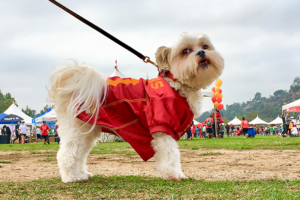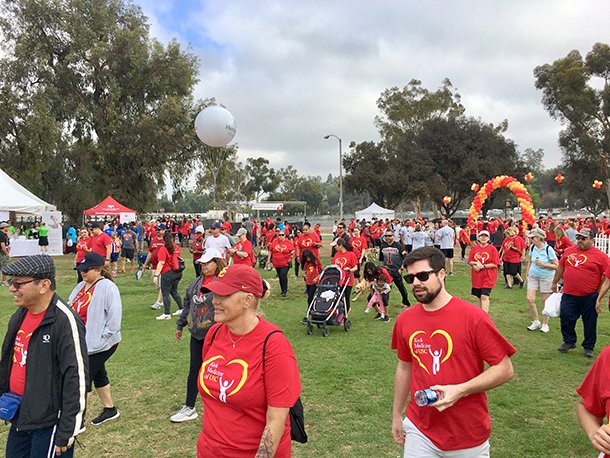Ilisa Juried never imagined her heart stopping at age 18.
“I was in New York City’s Grand Central Station singing and dancing, when suddenly I gripped my mother’s shoulder and collapsed,” Juried said.
Suffering from cardiac arrest, she fell to the ground as Deb Scholten and Therese Wauters, two vacationing nurses, began performing CPR on her motionless body. Thirty minutes passed before paramedics arrived and used an automated external defibrillator to shock her heart back to its normal rhythm.
Juried was later diagnosed with arrhythmia tachycardia, a syndrome causing fast, chaotic heart beats. The recovery process was long and stressful, and included the implantation of a cardioverter defibrillator.
“Every day I’m reminded of my strength, simply by what I’ve had to endure with my condition,” she said.
But on Sept. 29, with the Rose Bowl towering in the background, Juried was not stressed. Instead, she stood on a stage belting out the National Anthem, welcoming an exuberant crowd to the American Heart Association’s 2018 Pasadena Heart Walk.
This year marks the 25th anniversary of the Heart Walk, an event that has become instrumental in raising funds to fight heart disease and stroke. Since the first walk in 1993, mortality rates from heart disease, stroke and other cardiovascular conditions have plummeted by 45 percent.
Like many survivors, Juried feels the annual three-mile walk is a great way to build awareness around these important issues.
“My experience made me realize I had a purpose bigger than just living,” she said. “This event is about coming together in unity. You’re surrounded by survivors who are fighting back, and contributing to medical breakthroughs.”

Pets are welcome at the American Heart Association’s 2018 Pasadena Heart Walk. (Photo/Ricardo Carrasco III)
Heart disease and stroke claim the lives of more than 830,000 people every year. In Los Angeles County, these conditions contribute to more deaths than any other circumstance.
The Pasadena walk saw more than 450 Keck Medicine of USC staff members participating, with many having a personal investment in the cause.
“I almost died from two recent strokes, but was lucky enough to survive,” said Lorena Rivera, a metabolic and bariatric surgery coordinator at Keck Medical Center of USC. “Stroke is not selective; it can happen to anyone. The outcome can be devastating if proper treatment is delayed. Time is brain!”
Since 1993, the AHA has funded $3.4 billion in cardiovascular research. Every dollar raised by the Heart Walk helps create new technologies such as the artificial heart valve, cholesterol drugs, stents, and the mechanical heart pump. This year, Keck Medicine’s contributions totaled more than $40,000.
By 10:20 a.m., the Keck Medicine participants had finished walking and began making their way to a reception area decorated with cardinal and gold balloons.
One of the walkers, Karen Eilon, an administrative coordinator at Keck Medicine, snacked on a banana and smiled at her colleagues.
“With my dad’s recent scare, this year is different,” she said. “His heart attack is the reason why I am walking. The financial support provided by the event is not only helping hearts in our community, but also helping to improve patient care, and funding life-saving research. It means so much to me that people care enough to help my family fight these diseases.”
— Matthew Vasiliauskas


